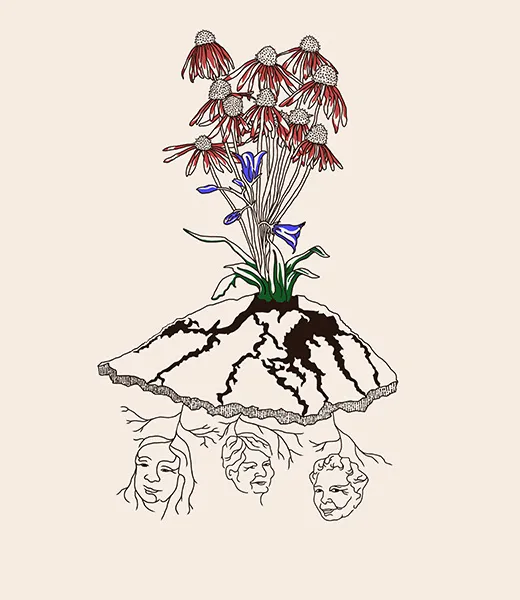International Roundtable to focus on decolonization

International Roundtable poster. Art by Gabi Estrada ’21.
October 6, 2022
The International Roundtable (IRT) is a fixture at Macalester, spanning back nearly three decades. A theme is chosen each year by the Kofi Annan Institute for Global Citizenship to facilitate discussion of important and timely matters. Themes in recent years have included student protests, pandemics and incarceration and race.
Macalester is holding the 29th annual edition International Roundtable (IRT) on which will be held Oct. 13-14, based on the theme: “On the (Im)Possibilities of Decolonizing Knowledge and Power.”
“I’ve always been interested in decolonization,” Professor and Chair of the French and Francophone Studies department Joëlle Vitiello said when asked about choosing this year’s theme. “The term decolonization itself has taken different terms, different meanings… I’ve been very interested in following all of that.”
Vitiello worked over the summer to find scholars and speakers from around the world who would come to Macalester and speak about their experiences with decolonizing their fields. The presenters at this year’s IRT come from a wide range of backgrounds and disciplines, and their presentations will reflect that diversity.
The first speaker is Professor Melanie Yazzie. She is Diné and is an assistant professor of American Indian Studies at the University of Minnesota Twin Cities. Her talk is entitled “We Must Make Kin to Get Free” and focuses on Indigenous political action.
Marisa Ruiz Trejo will give the second guest talk of the IRT entitled “Decolonize and Depatricarcalize Knowledge Through Women and Feminist Thinkers from Chiapas and Central America” with a focus on women and feminist speakers in Central America. Ruiz Trejo is a professor at the Autonomous University of Chiapas in Mexico and is an anthropologist, writer, journalist and activist.
The final presenter of the first day will be Adam Khalil. Khalil is a filmmaker and artist, as well as a member of the Ojibwe tribe, who is based in Brooklyn, N.Y. He has exhibited his work all over the United States and has worked with the media and cultural studies department on prior film-making projects. His presentation for the IRT is entitled “How to Commit Crimes Against Reality” and previews an introductory video for his organization New Red Order.
Professor Carole Boyce-Davies will give the final presentation of the IRT. She is the H.T. Rhodes Professor of Humane Letters and Professor of Africana Studies and Literatures in English at Cornell University. Her talk is entitled “The Semi-Colony? Decolonizing Gaps and Reparatory Justice” and examines how knowledge can work towards solving gaps caused by decolonization.
All presentations will be held in the campus center’s John B. Davis Lecture Hall. Their times can be found on IGC website.
“All of our speakers address this notion of liberation … assuming that decolonization is a long process, and it affects not just colonized people, but also the colonizers,” Vitiello said. “And so who needs to decolonize and be decolonized, what needs to be decolonized? It was a huge question that affected the way we look at cases, the way we look at cultural production, and the privileging of some forms of knowledge over others.”
There will also be seven student-led sessions at the IRT. Topics for those sessions range from ethnic minorities in Russia to the decolonization of Palestine and Turtle Island and the role of the Jewish community in those efforts.
The IRT will begin with a session run by Khant Wai Yan ’25 and Jess Nguyen ’24. Their session is titled “Who Tells Your Story? Post-Independence Hyper-Nationalism, Ethnocentrism, and the National Curriculum.” The session will include an oral history video and a panel with brief presentations, followed by a question and answer session. The idea to add an oral history video evolved out of the initial idea to have a documentary in the session.
“It was originally meant to be a documentary, but I think we changed the format into oral history,” Ngyuen said. “Who better to tell the story of these people than they themselves?”
Their session’s goal, according to Wai Yan, is for people to reflect on their education.
“People need to reflect back on their own education and … the education you have been taught in,” Wai Yan said. “There are a lot of people that are not educated … in a similar sense. They might have different clashing opinions, but you should listen to everyone.”
Another session entitled “Decolonizing Beauty Standards 101,” organized by Rola Cao ’25 and Zhihao Liu ’24, aims to deconstruct the continued influence of colonization on beauty standards in a variety of cultures.
“It’s … a workshop that we … dedicate the time to try to recognize and to try to… reflect on how these many different beauty standards across culture are still constantly colonized by Eurocentric values,” Cao said. “The major takeaway I want to achieve is how we can love our body and respect our biological appearance.”
Under this overarching theme of decolonization, both student and guest speakers are working towards the goal of making students think about decolonizing their knowledge. Vitiello expressed the hope that students will leave the IRT thinking about how colonization has influenced their thinking and the steps towards decolonizing their knowledge.
“I hope [students] will be intellectually stimulated, that they will think about … where we are? What are the next steps?” Vitiello said.














Del Ehresman, '68 • Oct 7, 2022 at 9:06 pm
A good topic. We need to remember that most history is written by the victors — the colonizers and empire builders. Their stories infest everything and distort the facts/information handed down over the centuries. It’s time to pay more attention to the “losers” and their stories to learn how they have been ignored, neglected, abused, and rendered impotent. It’s time for paradigms that are new and more accurate — time for learning the truths about empires, militarists, capitalists and their inhumanity.